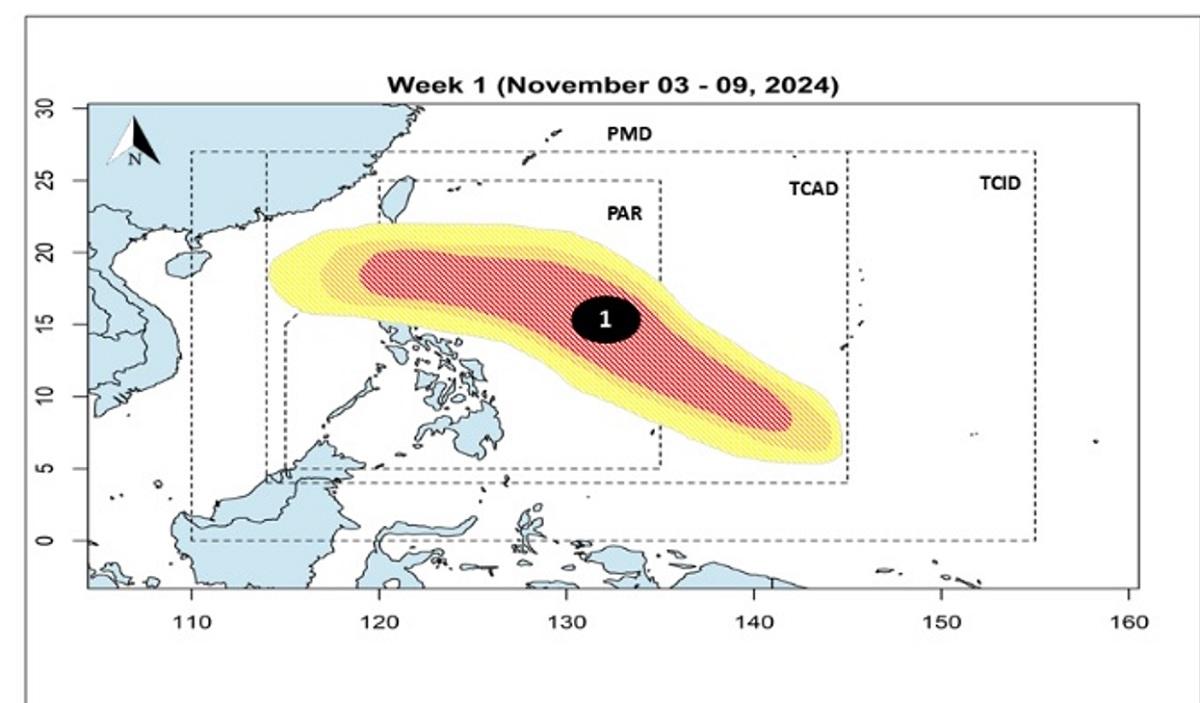High Chance of Tropical Cyclone Formation Forecasted for November
As the first week of November approaches, the Philippine Atmospheric, Geophysical, and Astronomical Services Administration (PAGASA) has reported a “high chance” for the formation of a tropical cyclone (TC) in the Tropical Cyclone Advisory Domain (TCAD). This development poses potential implications for weather conditions in the region, particularly Northern Luzon.
PAGASA Forecast Details
In a recent advisory released on Sunday, PAGASA alerted the public to a TC-like vortex (LV) detected over the southeastern boundary of the TCAD, anticipated to persist from November 3 to 9. The agency’s predictive models indicate that this system, termed TCLV 1, possesses the potential to develop into a tropical cyclone, making it one to watch closely as it approaches the Philippine Area of Responsibility (PAR).
“Model forecasts suggest that TCLV 1 will enter the southeastern boundary of the PAR with a high chance of TC development and is likely to move closer to northern Luzon,” said a PAGASA spokesperson. Should this forecast hold true, "Marce" will be the name given to the 13th tropical cyclone of the year once it officially enters Philippine territory.
Additional Cyclonic Activity Detected
Alongside the primary vortex, PAGASA has also identified two other TC-like vortices (TCLVs) emerging over the eastern boundary of its monitoring domain. While these vortices exhibit a “low to moderate” chance of developing into storms between November 10 and 16, the state weather bureau emphasizes the importance of monitoring these systems due to their potential trajectory.
According to PAGASA’s earlier statements, the Philippines may see one to two tropical cyclones in November, reiterating the necessity for preparedness as the typhoon season continues.
Why This Matters
The anticipated formation of tropical cyclones is particularly significant during the typhoon season in the Philippines, which typically spans from May to November. With the country already grappling with the impacts of past storms, the possibility of new cyclones can exacerbate challenges in infrastructure, agriculture, and daily life.
PAGASA continually urges residents in vulnerable areas to stay informed about the latest weather forecasts, especially given that modern meteorological technology allows for advanced warning systems that can significantly mitigate risks associated with severe weather events.
Potential Impact on the Technology Sector
While the imminent formation of a TC may primarily concern weather and safety, it also raises questions about the interaction between advanced technologies and disaster preparedness procedures. Technology systems designed to predict and analyze storm data increasingly impact public safety and emergency management strategies. As society becomes more reliant on data-driven insights, leveraging technology for effective disaster response is more critical than ever.
For example, satellite imagery and sophisticated weather modeling tools enable meteorologists to monitor these potential cyclones with heightened accuracy. Innovations in real-time data processing and machine learning can lead to better predictive capabilities, ultimately saving lives and resources. Moreover, telecommunications and service providers must be prepared for potential disruptions during severe weather events, emphasizing the need for resilient technology infrastructure.
The Path Ahead
As we look ahead to the beginning of November, it’s crucial to stay updated on PAGASA’s advisories. The weather bureau plays a vital role in ensuring the public is informed and prepared for any changes in weather patterns. Continuous monitoring and early warnings are essential elements in safeguarding communities from the impacts of tropical cyclones.
Residents are encouraged to make emergency plans and gather necessary supplies, as tropical cyclones can result in flooding, landslides, and power outages. Sharing information, resources, and stories about personal experiences during storms can foster a sense of community and raise awareness of the ongoing risks.
Feel free to share your thoughts or experiences regarding tropical cyclones in the comments below. How do you keep informed about the weather? Let us know!
For more information on tropical cyclones, visit PAGASA or explore articles on TechCrunch and Wired for insights on technology and their role in weather forecasting and disaster management.
Stay aware and continue to follow predictions and updates from credible sources. Engaging with your community and sharing knowledge can make a difference in preparedness and safety.

![‘Lee Kang-in played for 29 minutes’ PSG missed the chance to win a major victory due to Samba’s best defense show… 1-0 win against Lens → undefeated start [리그앙] ‘Lee Kang-in played for 29 minutes’ PSG missed the chance to win a major victory due to Samba’s best defense show… 1-0 win against Lens → undefeated start [리그앙]](https://wimg.mk.co.kr/news/cms/202411/03/news-p.v1.20241103.5000c4ae48ee4a7eb4eeb3dcdecb109d_P1.jpg)